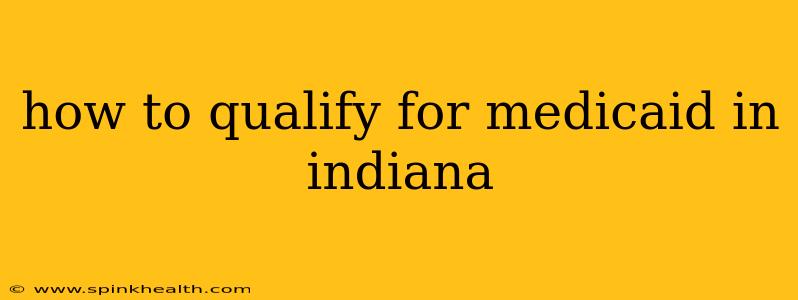Navigating the Indiana Medicaid Maze: A Guide to Qualification
The journey to securing Medicaid in Indiana can feel like navigating a labyrinth, filled with eligibility requirements and paperwork. But don't worry, this guide will illuminate the path, helping you understand the process and increase your chances of qualifying. We'll unravel the complexities, providing a clear and concise roadmap to help you and your family access essential healthcare.
Imagine Sarah, a single mother working part-time as a cashier. She's struggling to make ends meet and provide for her two young children. Medical bills are piling up, and she's worried about affording necessary care. Sarah's story isn't unique; many Hoosiers face similar challenges. Understanding Indiana's Medicaid program is the first step towards securing crucial healthcare coverage.
What is Medicaid in Indiana?
Indiana Medicaid, officially known as Healthy Indiana Plan (HIP), is a state and federally funded health insurance program providing low-income individuals and families with access to healthcare services. It covers a wide range of medical expenses, including doctor visits, hospital stays, prescription drugs, and more.
Who Qualifies for Indiana Medicaid (HIP)?
Eligibility for Indiana Medicaid hinges on several factors, primarily income and household size. The program utilizes a complex formula to determine eligibility, based on federal poverty guidelines. Income limits vary depending on your family size and the specific HIP program you're applying for.
Important Note: While income is a primary factor, other criteria, such as age, disability, pregnancy, and citizenship status, can also impact your eligibility.
What are the Income Limits for Indiana Medicaid?
This is where things get specific. There is no single income limit. The acceptable income level depends heavily on:
- Your family size: A family of four will have a higher income limit than a single individual.
- Your age: Certain age groups may have different eligibility guidelines.
- Your specific program: HIP offers several programs, each with its own income thresholds.
To find the precise income limit for your situation, you should use the official Indiana FSSA website's eligibility calculator or contact them directly.
What Documents Will I Need to Apply for Medicaid in Indiana?
Gathering the necessary documentation is crucial for a smooth application process. Typically, you'll need to provide:
- Proof of income: Pay stubs, tax returns, W-2 forms, etc.
- Proof of identity: Driver's license, state-issued ID, birth certificate.
- Proof of residency: Utility bills, lease agreement, mortgage statement.
- Social Security numbers: For all members of your household.
- Proof of U.S. citizenship or legal immigration status.
How Do I Apply for Indiana Medicaid?
Applying for Medicaid in Indiana is primarily done online through the state's Access Indiana website. You can also apply by phone or mail. The application process involves answering detailed questions about your income, household size, and other relevant information. Be prepared to upload or provide the required documents.
How Long Does it Take to Get Approved for Indiana Medicaid?
Processing times can vary, but you can generally expect a decision within a few weeks. However, it's essential to be patient and follow up if you haven't heard back within a reasonable timeframe.
What if I'm Denied Medicaid?
If your application is denied, you have the right to appeal the decision. The appeal process involves providing additional documentation or explaining why you believe you should be eligible. It’s important to understand the reasons for the denial and follow the instructions provided to appeal effectively.
What are the different programs under Indiana's Healthy Indiana Plan (HIP)?
Indiana offers various HIP programs tailored to different needs and situations. These programs may have varying eligibility requirements and cost-sharing structures. Familiarize yourself with the options available to determine which best suits your circumstances. Again, the Indiana FSSA website is your best resource for this information.
Sarah's journey to securing Medicaid might have seemed daunting, but with clear understanding and preparation, the process becomes manageable. By gathering the necessary documents, carefully reviewing the eligibility criteria, and seeking assistance when needed, you can increase your chances of securing healthcare coverage and access the vital medical care you and your family deserve. Remember, the Indiana FSSA website and their customer service representatives are valuable resources throughout this process.

